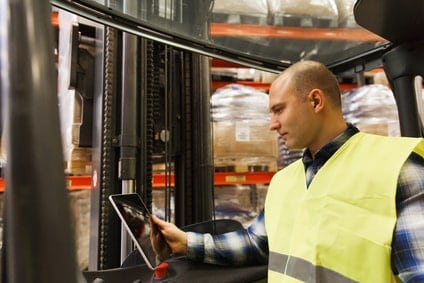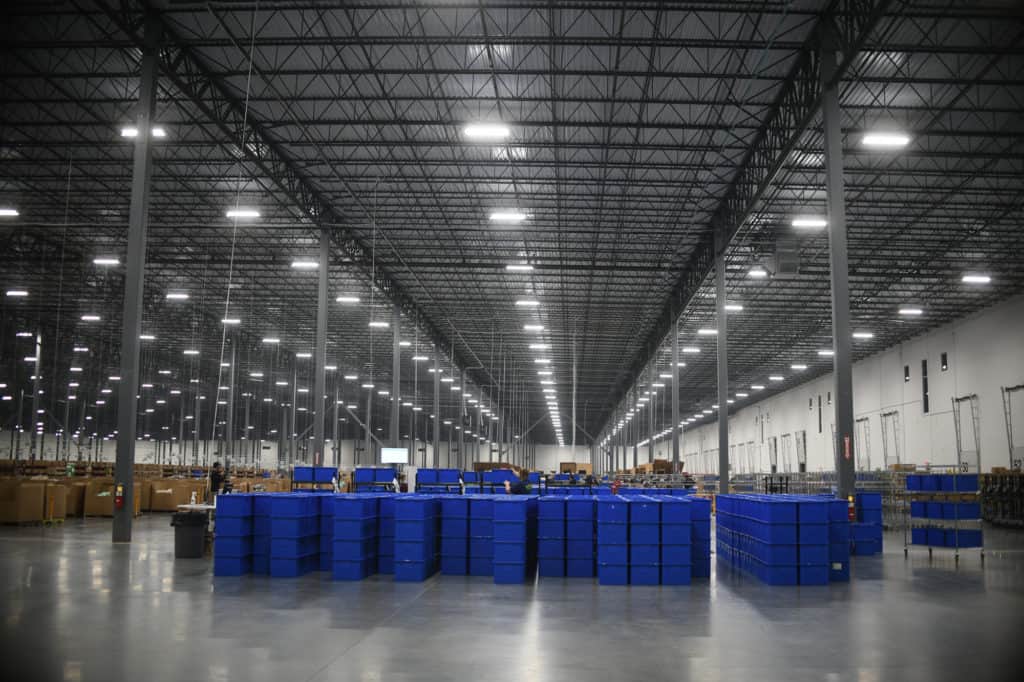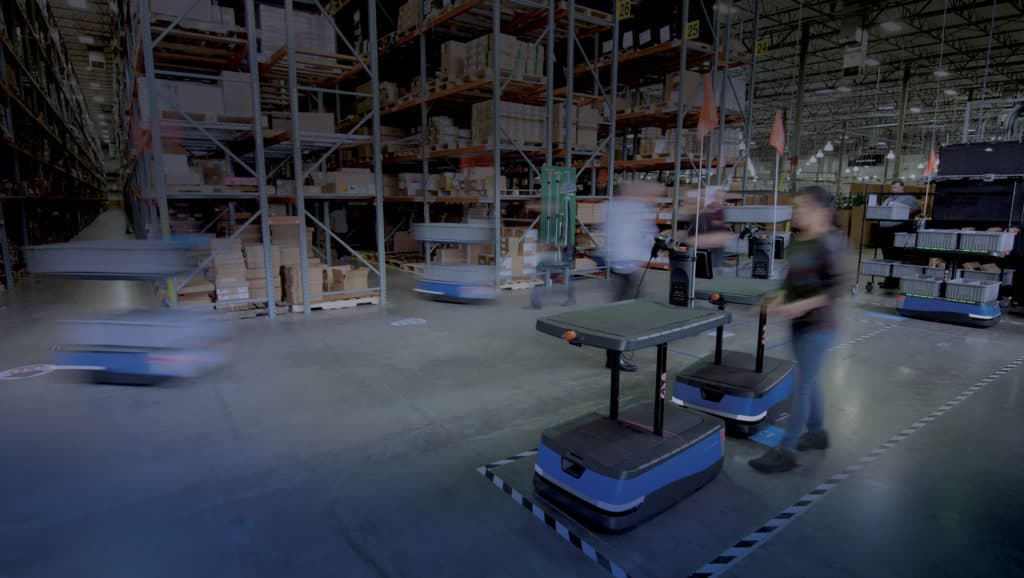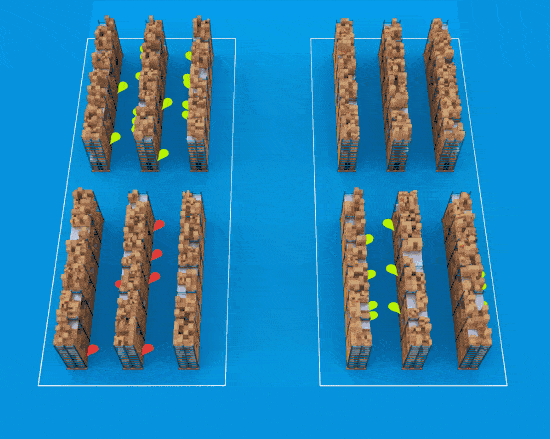Businesses commonly outsource order fulfillment to a third-party logistics provider (3PL). These companies are also referred to as fulfillment warehouses or fulfillment centers.
The services these companies provide include receiving orders, storing inventory, processing orders, and delivering the products to customers. This allows businesses to operate without the worry of managing inventory and dealing with shipments.
There are various services offered by 3PL companies. Some specialize in high-value goods and others provide robust security and monitoring for your inventory. Some 3PLs offer climate-controlled storage and shipping options, which is ideal if you sell perishable goods.
What are the benefits of fulfillment services?

There are several reasons why fulfillment services are growing in popularity — especially among small and medium-sized businesses.
Grow your business faster
Often, businesses outsource order fulfillment to 3PLs because they lack the space or personnel to carry out necessary tasks. For smaller businesses, a lack of in-house capabilities (or the capital to invest in them) can limit growth. By outsourcing these services, they’re able to expand their operations by focusing on marketing, product development and other processes vital to the success of a business.
Get fulfillment expertise
While you can claim expertise in your industry, that may not necessarily be the case for logistics and order fulfillment. By using third-party logistics providers, businesses can leverage a team that is knowledgeable in all the areas needed to keep their order processing functioning optimally.
Lower costs & save money
Businesses can also benefit from cost savings when using order fulfillment services. When you outsource order fulfillment, there’s no need to hire full-time staff, buy or rent warehouse space or purchase equipment to support order fulfillment operations. Instead, you pay a fraction of the costs for a provider that already has the infrastructure and associates to manage it all for you.
3PLs and fulfillment providers can help you save on materials and shipping costs. They handle higher volumes which likely qualifies them for bulk discounts for packaging and postage. Smaller companies handling these processes in-house are dealing with lower volumes, which wouldn’t necessarily qualify for volume discounts. 3PLs may pass those savings along to their clients, who can then allocate those funds to product development or other areas that support business growth.
Gain a competitive edge
Since you’re able to grow your business without spending an arm and a leg on logistics and warehousing, you can gain a competitive edge — even when you’re up against major competitors.
For example, lower costs can make it possible for smaller companies to compete by offering two-day shipping, free shipping, no-hassle returns, and other perks that appeal to consumers. For smaller companies that handle fulfillment in-house, these perks are challenging to pull off due to high costs or the manpower required to fulfill orders rapidly.
Scale more easily & expand faster
Agility is more than just a buzzword — it’s necessary if you want to succeed in today’s marketplace. A business with the flexibility to scale up and down as needed will find it easier to adapt to market shifts and seasonal demands.
Leveraging fulfillment services, and the flexibility and scalability that comes with them, also makes it easier for companies to expand and enter new markets. For example, a company wanting to expand its operations to another region would need to acquire warehouse space in that area, invest in equipment, and hire staff to operate the facility. On the other hand, a company using outsourced fulfillment can expand to a new area without investing in warehouse space and infrastructure by finding a fulfillment service provider that offers the infrastructure and services needed in the target region.
How do fulfillment services work?

There are five key steps involved in order fulfillment. Let’s take a look at what outsourcing to a 3PL or fulfillment services provider is like.
1. Delivering products to your fulfillment company
If you currently have inventory in stock, you can ship everything to your fulfillment service provider. Then, all future inventory purchased will go from the manufacturer directly to the fulfillment company.
Typically, you’d give the fulfillment company your purchase order or supplier’s order confirmation so they can receive the goods.
2. Processing inventory (receiving, sorting and storage)
Once everything is set up, your order fulfillment provider will manage the entire inventory process. This includes receiving products, sorting them and properly storing the items.
The provider’s associates will inspect the shipments for damage or missing items before passing them on for sorting and storage. In many cases, SKU numbers and barcode labels are used to track inventory levels and placement. Inventory tracking also helps to track sales volumes and other data to ensure you maintain proper inventory levels.
3. Routing orders to your fulfillment provider
After your products are stored, they’re ready for order processing. Whenever a customer places an order, it will route to the fulfillment provider and they’ll handle the packing and shipping. Order processing can be managed efficiently by integrating your POS system, order management software or e-commerce platform to the fulfillment company’s system.
There are other options if your system doesn’t fully integrate with theirs. For instance, you can use CSV files for bulk order data. A provider can manually enter the orders; however, manual order entry is inefficient and prone to human error.
4. Processing order shipments
Your customers are placing orders — now it’s time for the fulfillment company to pick, pack and ship them. They’ll ensure the correct items are selected and safely packed for shipment. The fulfillment company will seal boxes, weigh the order and label the boxes for shipment, ensuring that your orders arrive on time and in good condition so there are fewer return requests. And, you can take advantage of savings on shipping costs if your fulfillment provider receives bulk discounts that they pass on to you.
5. Processing customer returns
In retail, you’re bound to have customers who want to issue a return. For returns, the customer will ship the product to the fulfillment provider. After they receive it, they’ll inspect the package and approve it for a refund.
You can choose how you want the items handled from there. For instance, you can add it back to your inventory, put it on clearance or donate it. If it’s damaged, you can ask your fulfillment provider to discard it.
Other fulfillment services
Most fulfillment providers offer the services described above, but some providers go a little deeper, offering additional services like:
- Inventory control
- Customer support
- Merchandise insurance
The services offered should be a key consideration when choosing a fulfillment services provider.
Best practices for choosing the right fulfillment provider

It’s easy to see why businesses are outsourcing order fulfillment to 3PL companies. Outsourcing offers several benefits that can help your business grow and save money.
But how do you go about finding the right provider? Consider the following:
- Location: Ensure the provider can easily deliver to your customers wherever they are in the world. For example, regional fulfillment providers may not be able to accommodate businesses that need to ship globally with short delivery times.
- Cost: When considering fulfillment services, cost is a big factor, but it should also be weighed alongside possible benefits that you can’t achieve by handling fulfillment in-house (such as shorter delivery times). Will you benefit from bulk discounts? Or will you have to pay full price? Choose a 3PL that has good relationships with shippers and is willing to pass on savings from bulk discounts.
- Scalability: Will it be simple to scale up or down as needed? You need a provider that can accommodate seasonal fluctuations in demand and has the ability to scale along with your business as it grows.
- Automation: Technologically advanced 3PL companies are using automation tools, such as collaborative mobile robots to speed up order fulfillment processes. Check to see if the provider you’re considering is or will be using automation solutions to improve speed and accuracy.
For companies that lack the capital to invest in warehouse facilities and additional staffing, outsourcing fulfillment to a 3PL is a popular option. Outsourcing to a 3PL can also benefit businesses that can’t meet customer demand for shipping speed or cost with their in-house capabilities alone. Just make sure the provider you choose is agile, affordable and capable of meeting the needs of your business (and customers).


